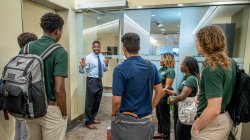Montclair State Innovates Inclusion of Psychoeducational Counseling Supports for Students in STEM Internships and Research Experiences
Goodey Leads an NSF HSI Institutional Transformation Project to Study the Impact of Mental Health Support on Student Success
Posted in: CSAM Research, PSEG ISS

As a continued leader in the success and social mobility of students, Montclair State University was recently awarded a National Science Foundation (NSF) Hispanic Serving Institution (HSI) Institutional Transformation Project to study “The Effectiveness of Psychoeducational Counseling in STEM Internship and Research Experiences.” This five-year $3,000,000 project, led by Nina Goodey, Professor of Chemistry and Biochemistry, aims to increase participation in high quality STEM experiential learning opportunities across Montclair State; embed professional psychoeducational group counseling into internships and research experiences to create more productive experiential learning opportunities with excellent socio-emotional support; and to generate knowledge on the impacts of this counseling intervention on students, faculty mentors, and program coordinators at an HSI.
This ambitious project is led by a transdisciplinary team that includes co-PIs Amy Tuininga, Professor of Earth and Environmental Studies, Michael Hannon, Associate Professor of Counseling, and Lora Billings, Dean of the College of Science and Mathematics (CSAM). The project was inspired and piloted by the PSEG Institute for Sustainability Studies (PSEG ISS) Green Teams summer internship program, managed by Tuininga as Director and Goodey as Associate Director. While it was generally accepted that students benefit from internship experiences, Tuininga and Goodey were keenly aware of how internships often lacked the elements required for students with a breadth of identities and life experiences to feel a sense of belonging, particularly in STEM fields.
Mature scientists know that STEM projects often involve setbacks and that embracing these challenges leads to resilience and unexpected scientific breakthroughs. Facing these challenges can exacerbate negative mental states for inexperienced researchers who lack adequate support in adjusting to their STEM identities.
They consulted with Hannon, a counselor educator whose research focuses on mental health and wellbeing, who suggested they fill the gap with the addition of weekly psychoeducational group counseling sessions for the interns. Embracing a unique opportunity, the sessions would be facilitated by PhD students in Counseling, who are professional counselors. The pilot project from 2022-2024, funded by the PSEG Foundation, was well received by interns and it seemed natural to extend the support to other students.
“The PSEG Institute for Sustainability Studies is pleased to lead innovation in best practices for inclusive internship experiences, like mental health support for young people that is much needed, particularly after COVID,” says Tuininga.
As a STEM partner, Goodey and Tuininga identified the growing CSAM Summer Undergraduate Research Program, managed by Billings, which similarly studied the benefits of undergraduate research on student outcomes at their HSI institution. This program was piloted in 2022 through a New Jersey Governor’s Emergency Education Relief Fund II (GEERF II) Opportunity Meets Innovation Challenge grant and then was supported by donor funding and a partnership with the NSF Garden State Louis Stokes Alliance for Minority Participation. The CSAM program expanded to over 50 mentor-led projects in the summer of 2024.
Mental health is key to managing stress and supporting productivity in both research and education. This project will empower all students to persist in STEM and holistically prepare them to succeed in the future workforce. Montclair State University is proud to be a leader in quantifying the value of the mental health support services.
The project has strong support from the University’s administration and contributes their HSI expertise as senior personnel. Provost and Senior Vice President for Academic Affairs, Junius Gonzales, brings his expertise in Hispanic students’ mental health and commitment to reduce equity gaps for student achievement and grow student internship and research opportunities. Milton Fuentes, Department of Psychology and MSU Provost’s Higher Education Academic Leadership Fellow, brings to the project a deep understanding of Hispanic students, mental health, and expertise in Latinx, multicultural, and family psychology.
The team will employ a mixed-methods approach to answer the following questions:
- what impact does psychoeducational group counseling have on research and internship experiences
- does participating in psychoeducational group counseling influence students’ sense of hope
- how does participating in counselor-facilitated, weekly affinity groups impact research mentors and project managers? The hypothesis is that the counseling component will provide students with clarity regarding their career paths; increased group-cohesion; the confidence and tools to confront and disrupt racism; necessary mental health support; and mentally-safe and inclusive internship and research experiences.
“The inclusion of counseling support for students participating in these internship and research experiences is exactly the kind of proactive, preventative services that all students deserve. We are hopeful that the comprehensive scope of support will be nothing short of transformational for the students, for those of us privileged to engage with and serve them, and for our institution.
The team will also invite faculty mentors and program managers to participate in their own counselor-facilitated affinity groups to establish best practices for mentoring students with intersecting and marginalized identities. With additional support by the College and Provost’s Office, the University hopes to maximize the reach of this program and make it sustainable. The team will share the practices broadly within Montclair State and with other institutions of higher education as a model to integrate counseling into research and internship experiences.
This research is supported by the National Science Foundation HSI Program under Grant No. 2345303, which aims to enhance undergraduate STEM education, broaden participation in STEM, and build capacity at HSIs. Any opinions, findings, and conclusions or recommendations expressed in this material are those of the authors and do not necessarily reflect the views of the National Science Foundation.
